Showing 97–108 of 302 results
The book investigates the bhakti beliefs and practices of the subaltern Kabirpanth community in comparison with the nirguna bhakti thought of their guru, the medieval iconoclastic bhakti saint Kabir. By doing so, the book attempts to investigate the Kabirpanthis’ attempt at dissent and submissiveness vis-a-vis the dominant Sanskritic Hindu tradition. This dual strategy of dissent and submissiveness is analysed through subaltern postcolonial lens as well as by employing social anthropological empirical research.
The book begins by making an analytical study of the medieval Bhakti movement and the nirguṇa bhakti teachings and practices of Kabir. Using postcolonial discursive tools such as postcolonial mimicry, ambivalence and hybridity, the author investigates how the bhakti beliefs and practices of the subaltern Kabirpanth community are elements of subversive and resistance stance against the dominant Sanskritic Hindu tradition.
This book is a must read for anyone interested in bhakti religion and movement and those who wish to analyse subaltern religion through postcolonial lens.
The book investigates the bhakti beliefs and practices of the subaltern Kabirpanth community in comparison with the nirguna bhakti thought of their guru, the medieval iconoclastic bhakti saint Kabir. By doing so, the book attempts to investigate the Kabirpanthis’ attempt at dissent and submissiveness vis-a-vis the dominant Sanskritic Hindu tradition. This dual strategy of dissent and submissiveness is analysed through subaltern postcolonial lens as well as by employing social anthropological empirical research.
The book begins by making an analytical study of the medieval Bhakti movement and the nirguṇa bhakti teachings and practices of Kabir. Using postcolonial discursive tools such as postcolonial mimicry, ambivalence and hybridity, the author investigates how the bhakti beliefs and practices of the subaltern Kabirpanth community are elements of subversive and resistance stance against the dominant Sanskritic Hindu tradition.
This book is a must read for anyone interested in bhakti religion and movement and those who wish to analyse subaltern religion through postcolonial lens.
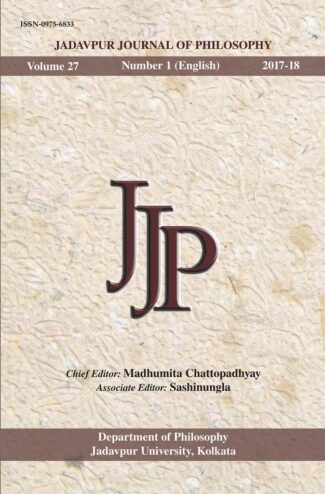
Jadavpur Journal of Philosophy is a refereed, bi-issue journal, in English (No. 1) and Bengali (No. 2) published annually by the Department of Philosophy, Jadavpur University, Kolkata, India. The journal volume in Bengali is titled Darsan Biksa. The journal is devoted to the publication of original scholarly papers in any branch of philosophy. Its objective is to encourage contributions from scholars, dealing with specific philosophical problems connected with their respective fields of specialization.
Jadavpur Journal of Philosophy is a refereed, bi-issue journal, in English (No. 1) and Bengali (No. 2) published annually by the Department of Philosophy, Jadavpur University, Kolkata, India. The journal volume in Bengali is titled Darsan Biksa. The journal is devoted to the publication of original scholarly papers in any branch of philosophy. Its objective is to encourage contributions from scholars, dealing with specific philosophical problems connected with their respective fields of specialization.
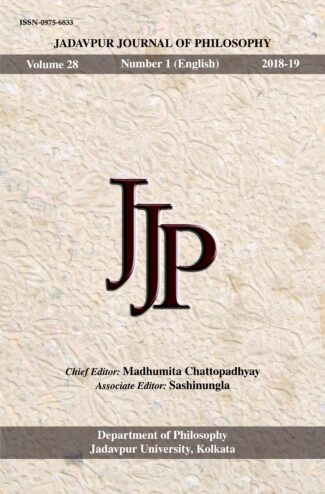
Jadavpur Journal of Philosophy is a refereed, bi-issue journal, in English (No. 1) and Bengali (No. 2) published annually by the Department of Philosophy, Jadavpur University, Kolkata, India. The journal volume in Bengali is titled Darsan Biksa. The journal is devoted to the publication of original scholarly papers in any branch of philosophy. Its objective is to encourage contributions from scholars, dealing with specific philosophical problems connected with their respective fields of specialization.
This book proposes to take up the question of Universal Causation to examine thoroughly as how far it is right to regard Brahman as the Universal Cause and how far strakra himself lent his support to each of the inter-conflicting schools of Vednta. This book should, therefore, benefit all who are devoted to the philosophic teachings of Advaita Vednta and its preceptors.
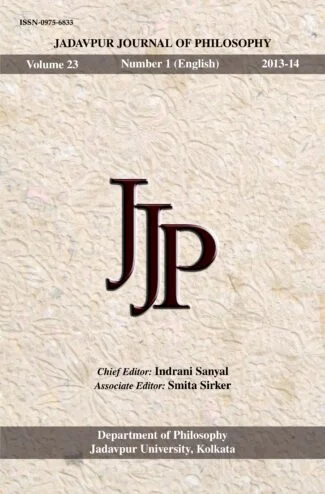
Jadavpur Journal of Philosophy is a refereed, bi-issue journal, in English (No. 1) and Bengali (No. 2) published annually by the Department of Philosophy, Jadavpur University, Kolkata, India. The journal volume in Bengali is titled Darsan Biksa. The journal is devoted to the publication of original scholarly papers in any branch of philosophy. Its objective is to encourage contributions from scholars, dealing with specific philosophical problems connected with their respective fields of specialization.
Jadavpur Journal of Philosophy is a refereed, bi-issue journal, in English (No. 1) and Bengali (No. 2) published annually by the Department of Philosophy, Jadavpur University, Kolkata, India. The journal volume in Bengali is titled Darsan Biksa. The journal is devoted to the publication of original scholarly papers in any branch of philosophy. Its objective is to encourage contributions from scholars, dealing with specific philosophical problems connected with their respective fields of specialization.
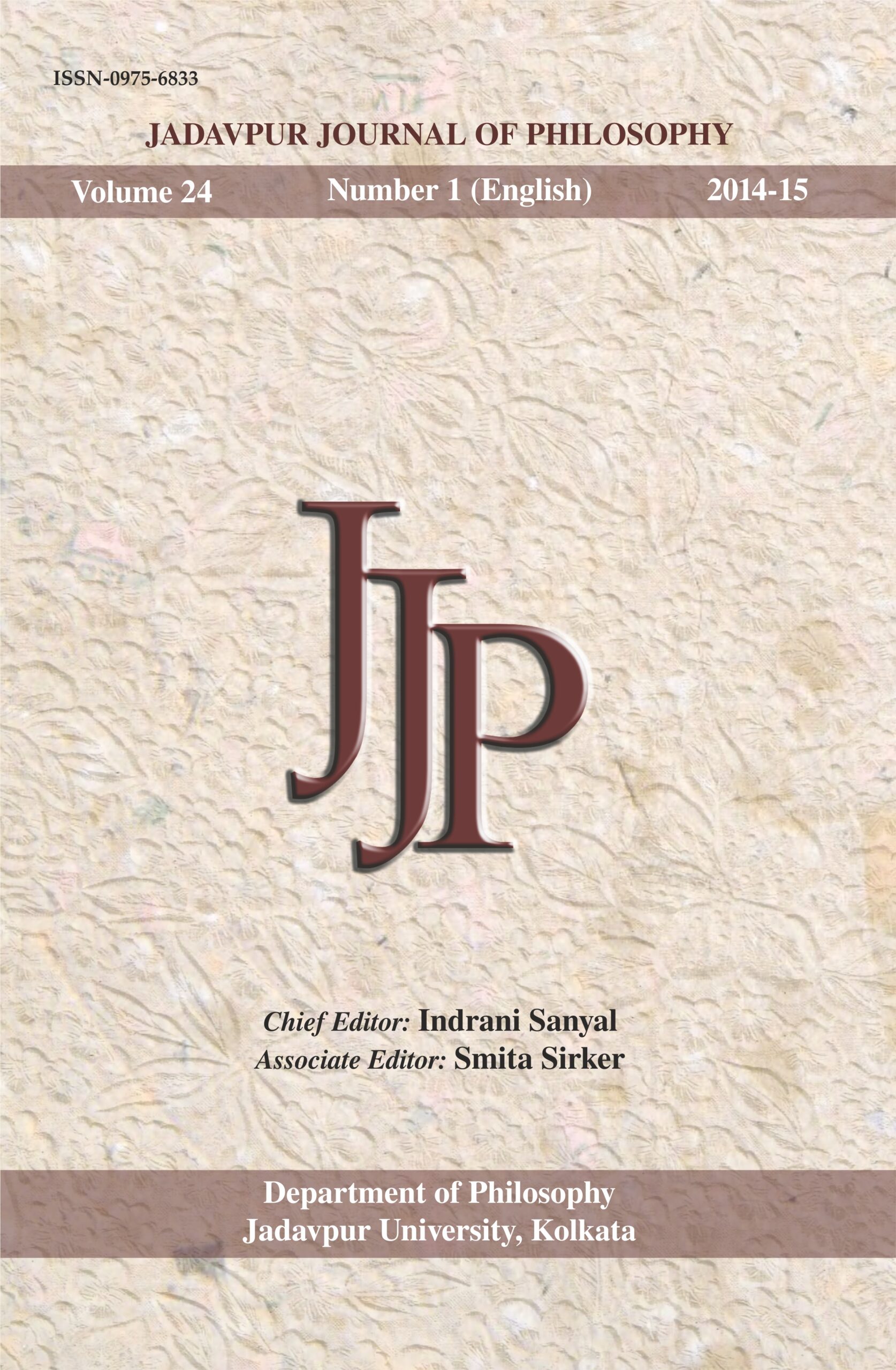
Jadavpur Journal of Philosophy is a refereed, bi-issue journal, in English (No. 1) and Bengali (No. 2) published annually by the Department of Philosophy, Jadavpur University, Kolkata, India. The journal volume in Bengali is titled Darsan Biksa. The journal is devoted to the publication of original scholarly papers in any branch of philosophy. Its objective is to encourage contributions from scholars, dealing with specific philosophical problems connected with their respective fields of specialization.
Jadavpur Journal of Philosophy is a refereed, bi-issue journal, in English (No. 1) and Bengali (No. 2) published annually by the Department of Philosophy, Jadavpur University, Kolkata, India. The journal volume in Bengali is titled Darsan Biksa. The journal is devoted to the publication of original scholarly papers in any branch of philosophy. Its objective is to encourage contributions from scholars, dealing with specific philosophical problems connected with their respective fields of specialization.

Jadavpur Journal of Philosophy is a refereed, bi-issue journal, in English (No. 1) and Bengali (No. 2) published annually by the Department of Philosophy, Jadavpur University, Kolkata, India. The journal volume in Bengali is titled Darsan Biksa. The journal is devoted to the publication of original scholarly papers in any branch of philosophy. Its objective is to encourage contributions from scholars, dealing with specific philosophical problems connected with their respective fields of specialization.
Jadavpur Journal of Philosophy is a refereed, bi-issue journal, in English (No. 1) and Bengali (No. 2) published annually by the Department of Philosophy, Jadavpur University, Kolkata, India. The journal volume in Bengali is titled Darsan Biksa. The journal is devoted to the publication of original scholarly papers in any branch of philosophy. Its objective is to encourage contributions from scholars, dealing with specific philosophical problems connected with their respective fields of specialization.
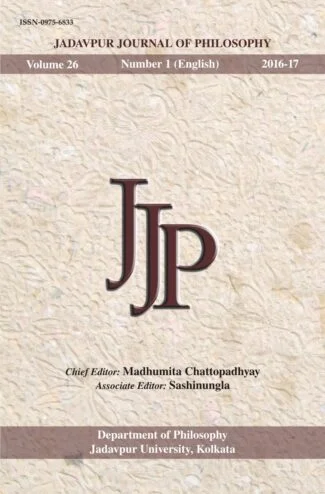
Jadavpur Journal of Philosophy is a refereed, bi-issue journal, in English (No. 1) and Bengali (No. 2) published annually by the Department of Philosophy, Jadavpur University, Kolkata, India. The journal volume in Bengali is titled Darsan Biksa. The journal is devoted to the publication of original scholarly papers in any branch of philosophy. Its objective is to encourage contributions from scholars, dealing with specific philosophical problems connected with their respective fields of specialization.
Jadavpur Journal of Philosophy is a refereed, bi-issue journal, in English (No. 1) and Bengali (No. 2) published annually by the Department of Philosophy, Jadavpur University, Kolkata, India. The journal volume in Bengali is titled Darsan Biksa. The journal is devoted to the publication of original scholarly papers in any branch of philosophy. Its objective is to encourage contributions from scholars, dealing with specific philosophical problems connected with their respective fields of specialization.

Jadavpur Journal of Philosophy is a refereed, bi-issue journal, in English (No. 1) and Bengali (No. 2) published annually by the Department of Philosophy, Jadavpur University, Kolkata, India. The journal volume in Bengali is titled Darsan Biksa. The journal is devoted to the publication of original scholarly papers in any branch of philosophy. Its objective is to encourage contributions from scholars, dealing with specific philosophical problems connected with their respective fields of specialization.
Jadavpur Journal of Philosophy is a refereed, bi-issue journal, in English (No. 1) and Bengali (No. 2) published annually by the Department of Philosophy, Jadavpur University, Kolkata, India. The journal volume in Bengali is titled Darsan Biksa. The journal is devoted to the publication of original scholarly papers in any branch of philosophy. Its objective is to encourage contributions from scholars, dealing with specific philosophical problems connected with their respective fields of specialization.
“Jain narrative as well as canonical literature indicates that the first tirthankara of Jains, Lord Adinath, was the founder of work and knowledge-based culture in India. He taught people how to live as communities and adhere to certain prearranged rules of coexistence and cooperation. He prescribed six different skills to be acquired by his subjects for worldly activities like (i) Asi (swordsmanship for protection), (ii) Masi (writing skills), (iii) Krishi (agriculture), (iv) Vidya (knowledge), (v) Vanijya (trade and commerce) and (vi) Shilp (crafts). These skills not only help in creating worldly wealth but also assist individuals and communities to live happily with overall prosperity. Following the path shown by Lord Adinath and subsequent tirthankaras. The Jain society from ancient times has been engaged in business activities with ahimsa (non-violence) as their guiding principle. Owing to this principle of ahimsa, we do find trends of the Jain community being engaged in commerce and trade. The historical trajectory of mercantile characteristics among the Jains continued till date and since India’s Independence, many renowned Jains have contributed to the development of India. This book documents the conceptual foundation of Jain tenets with reference to the Western approach toward business ethics; it also covers biographies of successful Jain entrepreneurs in the past and present. Apart from the details on the conceptual framework of Jain Business Ethics and Jain Business Engagements through the ages, it also contains various essays on Jain Values and Entrepreneurship. This book is an academic attempt to examine the Jain religion as an Eastern case study, which will be of interest to readers, who are looking for an alternative perspective in light of contemporary worries about global business and economic systems.”
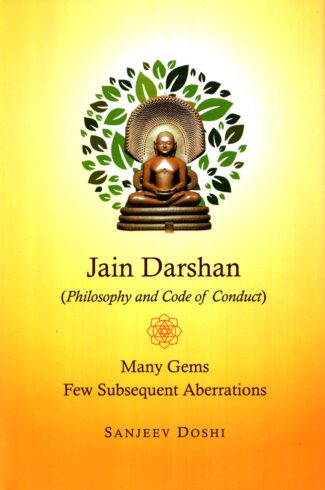
The title will seem misleading to many, as it will conjure up in their mind, an idea that the book is about important Jain temples and events and will take you on a pictorial tour of the same. In fact, many well-wishers had advised me to change the title.
Darshan is a name given to all Indian religious philosophies, be it Hindu, Jain or Bauddha.
Western philosophies are not called Darshans. Why is it so, is explained in the Introductory chapter. And when you read it, you will feel proud of our Indian culture and the strides we have taken in the spiritual field.
The title will seem misleading to many, as it will conjure up in their mind, an idea that the book is about important Jain temples and events and will take you on a pictorial tour of the same. In fact, many well-wishers had advised me to change the title.
Darshan is a name given to all Indian religious philosophies, be it Hindu, Jain or Bauddha.
Western philosophies are not called Darshans. Why is it so, is explained in the Introductory chapter. And when you read it, you will feel proud of our Indian culture and the strides we have taken in the spiritual field.

The title will seem misleading to many, as it will conjure up in their mind, an idea that the book is about important Jain temples and events and will take you on a pictorial tour of the same. In fact, many well-wishers had advised me to change the title.
Darshan is a name given to all Indian religious philosophies, be it Hindu, Jain or Bauddha.
Western philosophies are not called Darshans. Why is it so, is explained in the Introductory chapter. And when you read it, you will feel proud of our Indian culture and the strides we have taken in the spiritual field.
The title will seem misleading to many, as it will conjure up in their mind, an idea that the book is about important Jain temples and events and will take you on a pictorial tour of the same. In fact, many well-wishers had advised me to change the title.
Darshan is a name given to all Indian religious philosophies, be it Hindu, Jain or Bauddha.
Western philosophies are not called Darshans. Why is it so, is explained in the Introductory chapter. And when you read it, you will feel proud of our Indian culture and the strides we have taken in the spiritual field.